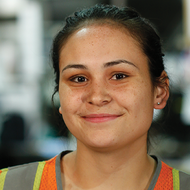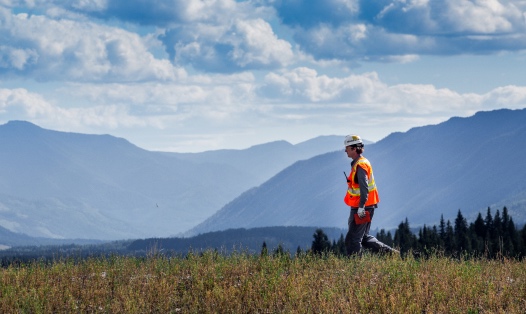Established in 2012, the Teck Canadian Aboriginal Bursary Award is part of our commitment to developing long-term relationships with Indigenous Peoples in the areas where we operate, and to building capacity in order to support the economic development of communities and Indigenous Peoples. Since inception, more than 19 post-secondary students from across the country have received this bursary. Connect recently spoke with two recipients about their career goals and what the bursary support has meant for them.

Bimadoshka Pucan
London, Ontario—Saugeen
Tell us a bit about yourself.
I am Anishinaabe-kwe from Saugeen First Nation #29 in Southern Ontario. At 32, I wrote the GED and went to community college. I enjoyed learning and continued on to university. From there, I completed an honours undergraduate degree in Psychology and First Nations Studies, followed by a Master in Public Health.
What is your field of study?
I am currently completing my PhD dissertation in Anthropology.
What are your career goals?
I plan to return to my community to support positive change and growth. I am interested in systems integration and risk/crisis management.
What is your proudest accomplishment to date?
I am most proud of my children. They are growing into amazing human beings. I believe that if we want our children to get an education, then we have to lead by example.
What did being a recipient of Teck Canadian Aboriginal Bursary mean to you?
As a single mother of three, I live away from my extended family and from my community. I am the sole financial provider for my family and this causes a lot of stress for me. This bursary allowed me to concentrate more on my studies. I pray that this bursary continues to help single parents who are trying to improve the lives of their families. I am absolutely thankful.

Cole Burns
Wildwood, Alberta
Tell us a bit about yourself.
I’m a recent graduate from the University of Alberta and just received my Bachelor of Science in Environmental and Conservation Biology (Major in Conservation Biology) in June 2016. I have always been passionate about the well-being of the environment, and have ambitions to contribute towards the betterment of the natural world in some way.
What is your field of study?
I’m almost halfway through my Master of Science in Biological Sciences, specializing in Ecology at the University of Calgary, with specific focus on plant ecology and pollination biology. The premise of my MSc project is to study the role of microclimate on pollinator availability for the Arctic raspberry (Rubus arcticus), a fruiting plant that has economic significance as a cultivar in European Scandinavian nations. It is also culturally significant as a historical wild food crop to Canadian First Nations Peoples such as the Inuit and Cree.
What are your career goals?
My ultimate career goal is to one day work with the Committee On the Status of Endangered Wildlife In Canada (COSEWIC) as a vascular plant specialist collecting data and providing status reports on plant species at risk in Canada. Short term, I hope to work as a conservation biologist/plant ecologist promoting sustainability of our native flora. I would also like to work alongside First Nation communities and stakeholder groups to ensure the ecosystems encompassed by their ancestral lands are protected.
What is your proudest accomplishment to date?
Completing my undergraduate degree on time and graduating with distinction, as well as being on the dean’s list for the graduating class of 2016. The first two years were quite difficult, especially after transitioning from a graduating class of 32 students in a small rural community. Also, being the youngest child of a large farming family, I had to mostly pay my own way as well as apply for student loans.
What did being a recipient of Teck Canadian Aboriginal Bursary mean to you?
Receiving the Teck Canadian Aboriginal Bursary lessened my student loan amount for graduate school and also allowed me to better focus on my studies. I’m very grateful for Teck’s generosity in enabling me to pursue my career goals and furthering my post-secondary education—it’s very much appreciated!


